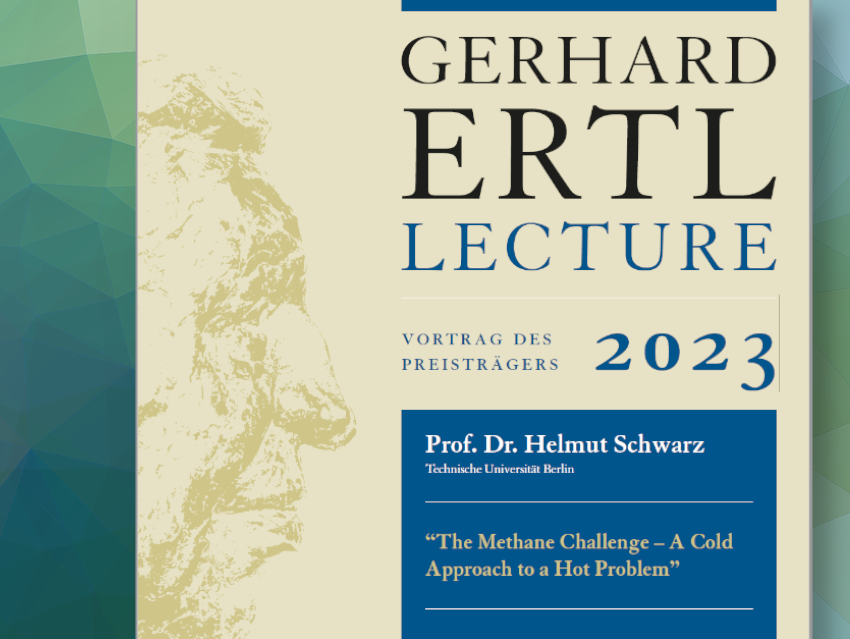Professor Helmut Schwarz, TU Berlin, Germany, is honored with the Gerhard Ertl Lecture Award and will give a lecture entitled „The Methane Challenge – A Cold Approach to a Hot Problem“. Helmut Schwarz is honored for his groundbreaking investigations of reaction mechanisms using mass spectrometric techniques. His work has significantly contributed to our understanding of fundamental processes in catalysis, organometallic bond activation and functionalization, and atmospheric chemistry. With his work, Helmut Schwarz has improved the understanding of catalytic processes and made important contributions to the development of tailor-made catalysts as well as to advancing the analytical capabilities of mass spectrometry.
Furthermore, Helmut Schwarz has dedicated himself to enhancing academic institutions in Germany and beyond. He has done so through his roles as co-founder of the Berlin-Brandenburgische Akademie der Wissenschaften, Vice-President of the German Science Foundation, and president of the Humboldt Foundation, among others.
In honor of Professor Gerhard Ertl, who was awarded the Nobel Prize in Chemistry in 2007 for his scientific contributions to the field of catalysis, the Gerhard Ertl Lecture is annually presented to an outstanding researcher.
You can watch the recording here: https://www.youtube.com/watch?v=4_JJTYfLKuE
Gerhard Ertl Lecture Award
In 2008, the three Berlin universities (Freie Universität, Humboldt-Universität zu Berlin, Technische Universität) and the Fritz Haber Institute of the Max Planck Society established the Gerhard Ertl Lecture Award to commemorate Gerhard Ertl’s Nobel Prize in Chemistry, which he received in 2007. The award honors outstanding researchers in the field of catalysis from the wider research environment of Gerhard Ertl. The BASF-sponsored award includes prize money, a one-week research stay at the participating Berlin institutions, and a festive keynote lecture.
The prize is awarded for the 16th time by a commission consisting of members of the Berlin universities (Joachim Sauer (HU Berlin), Matthias Drieß (TU Berlin), and Eckart Rühl (FU Berlin)) and the directors of the Fritz Haber Institute. Gerhard Ertl advises the commission on the selection of candidates.
Helmut Schwarz
Helmut Schwarz, born on August 6, 1943, studied chemistry at TU Berlin, Germany, and received his Ph.D. there in 1972. He completed his habilitation at TU Berlin in 1974 and was appointed Professor of Chemistry there in 1978. In addition to many other commitments, Schwarz served as President of the Alexander von Humboldt Foundation, Bonn, Germany, from 2008 to 2017.
Among many other honors, Helmut Schwarz has received the Liebig Medal from the German Chemical Society (Gesellschaft Deutscher Chemiker, GDCh) in 1998, the Order of Merit of the Federal Republic of Germany in 2012, the Karl Ziegler Prize from the GDCh in 2015, the Leonardo da Vinci Award 2021 from the European Academy of Sciences, and numerous honorary doctorates.
Selected Publications
- Counter-Intuitive Gas-Phase Reactivities of [V2]+ and [V2O]+ towards CO2 Reduction: Insight from Electronic Structure Calculations,
Jilai Li, Caiyun Geng, Thomas Weiske, Helmut Schwarz,
Angew. Chem. Int. Ed. 2020, 59, 12308–12314.
https://doi.org/10.1002/anie.202001223 - On the Crucial Role of Isolated Electronic States in the Thermal Reaction of ReC+ with Dihydrogen,
Jilai Li, Caiyun Geng, Thomas Weiske, Helmut Schwarz,
Angew. Chem. Int. Ed. 2020, 59, 9370–9376.
https://doi.org/10.1002/anie.202001599 - Revisiting the Intriguing Electronic Features of the BeOBeC Carbyne and Some Isomers: A Quantum-Chemical Assessment,
Jilai Li, Caiyun Geng, Thomas Weiske, Mingfei Zhou, Jun Li, Helmut Schwarz,
Angew. Chem. Int. Ed. 2020, 59, 17261–17265.
https://doi.org/10.1002/anie.202007990 - Complete cleavage of the N≡N triple bond by Ta2N+ via degenerate ligand exchange at ambient temperature: A perfect catalytic cycle,
Caiyun Geng, Jilai Li, Thomas Weiske, Helmut Schwarz,
Proc. Natl. Acad. Sci. USA 2019, 116, 21416–21420.
https://doi.org/10.1073/pnas.1913664116 - How and Why Do Cluster Size, Charge State, and Ligands Affect the Course of Metal-Mediated Gas-Phase Activation of Methane?,
Helmut Schwarz,
Israel J. Chem. 2014, 54, 1413–1431.
https://doi.org/10.1002/ijch.201300134 - Thermal Hydrogen-Atom Transfer from Methane: The Role of Radicals and Spin States in Oxo-Cluster Chemistry,
Nicolas Dietl, Maria Schlangen, Helmut Schwarz,
Angew. Chem. Int. Ed. 2012, 51, 5544–5555.
https://doi.org/10.1002/anie.201108363 - Chemistry with Methane: Concepts Rather than Recipes,
Helmut Schwarz,
Angew. Chem. Int. Ed. 2011, 50, 10096–10115.
https://doi.org/10.1002/anie.201006424 - Gas-phase activation of methane by ligated transition-metal cations,
Detlef Schröder, Helmut Schwarz,
Proc. Natl. Acad. Sci. USA 2008, 105, 18114–18119.
https://doi.org/10.1073/pnas.0801849105 - Thermal Activation of Methane by Tetranuclear [V4O10]+,
Sandra Feyel, Jens Döbler, Detlef Schröder, Joachim Sauer, Helmut Schwarz,
Angew. Chem. Int. Ed. 2006, 45, 4681–4685.
https://doi.org/10.1002/anie.200600188




